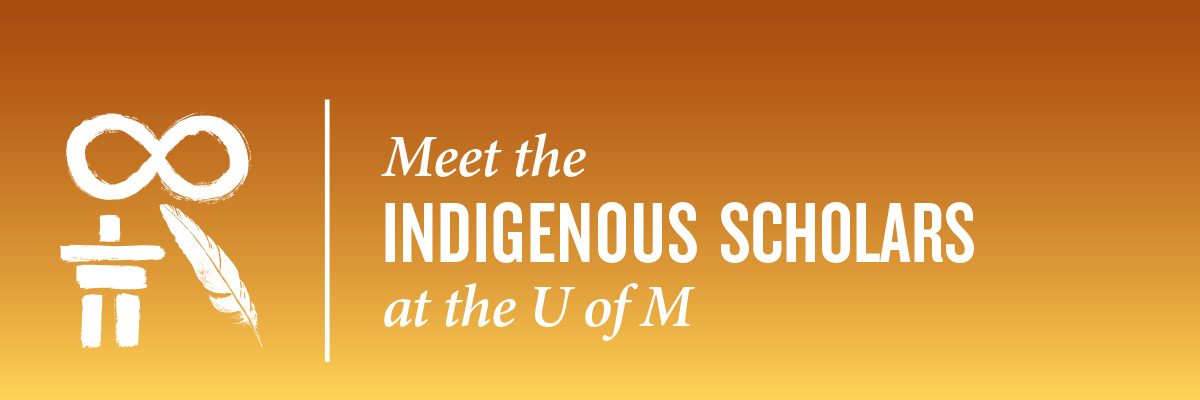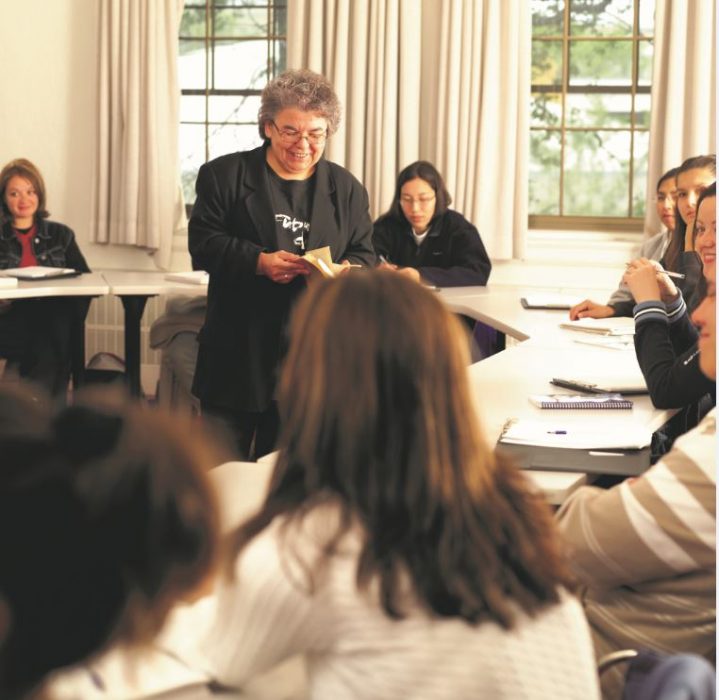
Meet Indigenous Scholar: Dr. Emma LaRocque
Since the late 1970s, Emma LaRocque has been a part of the University of Manitoba – both as a graduate student (earning her Ph.D. in Interdisciplinary Studies in 1999) and as Instructor in Native Studies. In 2001 she moved to the rank of Professor, and has continued in Native Studies. On November 1, she will present as part of the Indigenous Scholars Speaker Series. The series highlights the research and expertise of Indigenous scholars, while providing new opportunities for students, staff and faculty to learn about Indigenous perspectives and knowledges. In her talk, Decolonizing the University Classroom: Looking Back and Looking Forward she will trace her experiences, observations and analyses from teaching within a very ‘western’ climate to current times and trends of ‘Indigenization’.
We sat down with LaRocque to ask about her experiences.
HOW DID YOU CHOOSE YOUR CAREER PATH? DID YOU HAVE ANY INFLUENCES THAT LED YOU TO YOUR CURRENT INTERESTS?
Emma LaRocque: Well, first of all, I did not grow up in a culture that thought in terms of career paths, especially for girls. Metis people in northern Alberta in the 1950s struggled to make a living – as so many do still today, by the way – so I think adults thought more along the lines of survival. The first time I thought of a ‘career’ was sometime in grades 7-9 – I idolized my teacher and decided I wanted to be a teacher just like him. His perceptive kindness brought me out of my shell, and he perhaps made all the difference in my life.
WHAT IS YOUR CURRENT RESEARCH PROJECT?
Right now I am working with a colleague, Dr. Elaine Coburn, from York University who is editing and assembling my works into a Reader’s Collection. It is actually a much slower process than I anticipated – partly because of our schedules, but mostly because there is a lot to go through. Over my career, I have published some 50-60 essays, chapters and articles. I have also published some 27 poems in a wide venue of literary magazines, journals and periodicals. Dr. Coburn approached me to do this Reader to help make my works more accessible to a variety of readers, including scholars, students and the general public.
WHAT CAN WE EXPECT FROM YOUR TALK ON NOVEMBER 1?
I have been here a long time and my pedagogical goal has always been not only to present the Native (particularly First Nations and Metis) experience in this country but to do so with decolonizing eyes – decolonizing for both Indigenous and in a different way, non-Indigenous. This approach and information contradicts the Canadian National Dream story and perceptions; so it has not always been well received by non-Native students, administration or even colleagues. I was quite naïve when I first began as a very young, non-white, non-middle-class and idealistic instructor so it took me some time before I came to understand some of the hostility and disrespect that I experienced. Non-Native (and even some Native) students and administration were expecting what I call ‘cultural tidbits’, but I was offering an unsanctified history. There was no ‘Post-colonial’ consciousness – much less, ‘indigenization’ consciousness – on this campus in the 1970s or perhaps even into the 1980s and 1990s. However, lately, so much has changed for the better – but it is important for us to keep thinking through what these changes are and what they might mean for the ever changing generations to come.
WHAT DO YOU FEEL THE DEPARTMENT OF NATIVE STUDIES AT UM IS DOING WELL IN THE AREAS OF RESEARCH, TEACHING AND SERVICE?

Dr. Emma LaRocque
The Department of Native Studies is truly on the cutting edge regarding research, teaching and service relating to the historical and contemporary position of Indigenous peoples in Canada. If you look at each of our research profiles, you will see that most of us have very impressive publication records and our works are known internationally. We offer a wide variety of areas ranging from land-based learning to contemporary Indigenous literatures that feature many different Indigenous cultures. We have attracted academics from diverse fields including history, literature, gender studies, Metis studies, post-colonial studies, political science and anthropology. We would love to gain more faculty and especially those who specialize in Native languages, sociology and urbanization. We have a robust graduate program which has attracted international and Canadian students from all sorts of backgrounds doing some amazing research in Indigenous knowledges, literatures, identities, religions, resources, economics, community development, colonial mis/representation, colonization/decolonization, social and urban issues and so forth. With more resources we could attract even more such students! Given we have always been a small and shall we say, under-the-radar department, we have done an outstanding job. And this is not to mention all the community service we engage in. I am very proud of our department.
ONE OF UM’s STRATEGIC PRIORITIES IS “CREATING PATHWAYS TO INDIGENOUS ACHIEVEMENT”. WHAT DO YOU FEEL THE UM IS DOING WELL IN THE AREAS OF STRIVING TO IMPROVE INDIGENOUS RELATIONS AND EXPERIENCES FOR INDIGENOUS PEOPLE AT AND WITH UM?
It has taken a long time for this university to realize and acknowledge issues urgently relevant to Indigenous students and staff on campus. But, this too is changing somewhat for the better. However, I must emphasize that we need to constantly evaluate what these things mean to continue to move forward. What is ‘indigenization’? For that matter, what is ‘reconciliation’? And do these concepts or movements, if they are movements, create a truly decolonial state of things? I can only think of benefits for all concerned if we put resources in areas of Indigenous studies. The more resources we put the more we will attract not only Indigenous students but also non-Indigenous as well as international students. The fact is Indigenous studies is an “exploding” area that many other universities are quickly developing. Advancing the Department of Native Studies is one of the keys to help us hold our cutting edge.
WHAT’S NEXT FOR YOU?
I am on research leave this term. Come January, I will be teaching a graduate course on colonization/decolonization and an undergraduate course on Canadian Indigenous Literature. And, I am currently writing a short, kind of fun, essay for a collection that will probably come out in 2019.
LaRocque presents Decolonizing the University Classroom: Looking Back and Looking Forward on Thursday, November 1, 11:45 am – 12:45 am in Room 200, Education Building.






